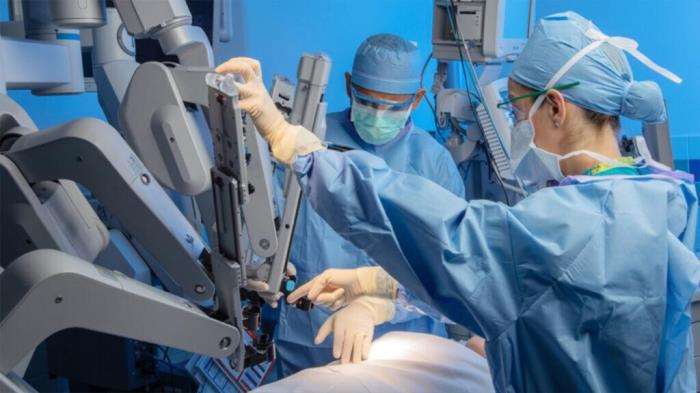Colon cancer, also known as colorectal cancer, arises from the inner lining of the colon or rectum. It is a significant health concern globally, including in India, where its incidence is rising. Treatment typically involves a combination of surgery, chemotherapy, and radiation therapy. The choice of treatment depends on the stage of cancer, overall health, and patient preferences. Minimally invasive surgery (MIS) has emerged as a key technique in managing colon cancer, offering several advantages over traditional open surgery.
Medical disclaimer: This content is for general awareness and does not replace a doctor’s consultation. For diagnosis or treatment decisions, consult a qualified specialist.
Introduction to Minimally Invasive Surgery Techniques
Minimally invasive surgery refers to surgical techniques that reduce the size of incisions needed to perform operations. Techniques such as laparoscopy and robot-assisted surgery are commonly used. These approaches allow surgeons to operate through small incisions using specialized instruments and cameras, resulting in less trauma to the body. The primary goal is to achieve effective surgical outcomes while minimizing recovery time and complications.
Benefits of Minimally Invasive Surgery for Colon Cancer
Minimally invasive surgery offers numerous benefits for patients with colon cancer. Key advantages include reduced postoperative pain, shorter hospital stays, and quicker recovery times. Patients often experience less scarring and a lower risk of complications such as infections. These benefits contribute to improved quality of life and allow patients to resume normal activities sooner, making MIS a preferred option for many oncologists.

Indications for Minimally Invasive Surgery in Colon Cancer
Minimally invasive surgery is indicated for various stages of colon cancer, particularly in early-stage disease where the tumor is localized. It is also suitable for patients who are not candidates for open surgery due to other health concerns. Surgical procedures such as laparoscopic colectomy are commonly performed to remove cancerous sections of the colon while preserving surrounding healthy tissue, which is crucial for maintaining bowel function.
Comparison of Open Surgery and Minimally Invasive Surgery
Open surgery for colon cancer involves larger incisions and greater disruption of abdominal tissues. In contrast, minimally invasive techniques utilize smaller incisions, which leads to less pain and faster recovery. Studies have shown that patients undergoing MIS often experience fewer complications and shorter hospital stays compared to those who have open surgery. However, the choice of technique should be individualized based on the patient's specific condition and the surgeon's expertise.
Role of Laparoscopic Surgery in Colon Cancer Management
Laparoscopic surgery has become a standard approach for treating colon cancer. This technique involves the use of a laparoscope, a thin tube with a camera, allowing surgeons to visualize the surgical area without large incisions. Laparoscopic colectomy has been associated with less postoperative pain, reduced blood loss, and faster recovery times. As a result, many patients prefer this approach when it is feasible for their specific cancer diagnosis.
Robot-Assisted Surgery for Colon Cancer Treatment
Robot-assisted surgery represents an advanced form of minimally invasive surgery, enhancing the surgeon's ability to perform complex procedures with precision. The robotic system provides a three-dimensional view and greater dexterity, which can be particularly beneficial in challenging anatomical areas. This technology has been shown to improve surgical outcomes and reduce recovery times, making it an attractive option for treating colon cancer.
Patient Selection Criteria for Minimally Invasive Surgery
Not all patients with colon cancer are suitable candidates for minimally invasive surgery. Factors influencing the decision include the tumor's size, location, and stage, as well as the patient's overall health and prior surgeries. A thorough evaluation by a multidisciplinary team is essential to determine the appropriateness of MIS. Patients with localized tumors and good overall health are generally more likely to benefit from this approach.

Potential Risks and Complications of Minimally Invasive Surgery
While minimally invasive surgery is associated with fewer complications than open surgery, it is not without risks. Potential complications include bleeding, infection, and damage to surrounding organs. Additionally, some patients may experience complications related to the use of carbon dioxide gas during laparoscopic procedures. It is crucial for patients to discuss these risks with their healthcare provider to make informed decisions regarding their treatment options.
Postoperative Care After Minimally Invasive Surgery
Postoperative care following minimally invasive surgery for colon cancer is critical for ensuring optimal recovery. Patients are typically encouraged to mobilize early to reduce the risk of complications such as blood clots. Pain management is also essential, and medications may be prescribed to manage discomfort. Follow-up appointments are necessary to monitor healing and assess the need for additional treatments, such as chemotherapy.
Long-Term Outcomes of Minimally Invasive Surgery in Colon Cancer
Long-term outcomes for patients undergoing minimally invasive surgery for colon cancer are generally favorable. Studies indicate that MIS is associated with similar survival rates compared to traditional open surgery. Additionally, patients often report improved quality of life due to faster recovery and less postoperative pain. Ongoing research continues to investigate the efficacy of minimally invasive techniques in various stages of colon cancer.
Patient Education and Informed Consent in Minimally Invasive Surgery
Patient education is a vital component of the surgical process. Healthcare providers must ensure that patients understand the benefits and risks associated with minimally invasive surgery for colon cancer. Informed consent should include discussions about the procedure, potential complications, and alternative treatment options. Empowering patients with knowledge allows them to make informed decisions about their healthcare.
Multidisciplinary Approach to Colon Cancer Treatment
A multidisciplinary approach is essential for the effective management of colon cancer. This approach involves collaboration among oncologists, surgeons, radiologists, and pathologists to develop a comprehensive treatment plan tailored to the patient's needs. Minimally invasive surgery is often integrated into this plan, ensuring that patients receive the most appropriate and effective care throughout their treatment journey.
Future Directions in Minimally Invasive Surgery for Colon Cancer
The field of minimally invasive surgery is continually evolving, with ongoing research focused on improving techniques and outcomes. Innovations such as enhanced imaging technologies and advanced robotic systems are expected to further enhance the effectiveness of minimally invasive approaches for colon cancer treatment. Future studies will likely explore the long-term benefits and potential applications of these advancements in clinical practice.
Cost Considerations in Minimally Invasive Surgery
Cost is an important factor when considering minimally invasive surgery for colon cancer. While the initial costs may be higher due to advanced technology and equipment, the overall expenses can be lower due to shorter hospital stays and quicker recovery times. Patients should discuss financial considerations with their healthcare providers and insurance companies to understand coverage options and out-of-pocket expenses.
Patient Experiences and Testimonials
Patient experiences with minimally invasive surgery for colon cancer can provide valuable insights into the benefits and challenges of this treatment approach. Many patients report positive outcomes, including reduced pain and faster recovery, which significantly enhance their quality of life. Testimonials can help prospective patients understand what to expect and encourage them to consider MIS as a viable treatment option.
Challenges in Implementing Minimally Invasive Surgery
Despite its advantages, the implementation of minimally invasive surgery for colon cancer faces several challenges. These include the need for specialized training for surgeons, availability of advanced technology, and patient selection criteria. Additionally, some healthcare facilities may lack the resources to provide MIS, limiting access for certain patient populations. Addressing these challenges is essential for expanding the use of minimally invasive techniques in colon cancer treatment.
Comparing Robotic Surgery and Traditional Surgery for Colon Cancer
Understand the differences between robotic surgery and traditional surgery for colon cancer treatment. Robotic surgery offers precision, reduced recovery time, and smaller incisions, while traditional surgery remains a viable option in certain cases. This comparison highlights the benefits, risks, and suitability of each approach, helping patients make informed decisions about their care.
Advances in Targeted Therapy for Colon Cancer Patients
Discover the latest advances in targeted therapy for colon cancer patients. These innovative treatments focus on specific genetic and molecular markers of cancer cells, minimizing harm to healthy tissues. Learn how targeted therapies are transforming outcomes and offering new hope to patients with advanced colon cancer.
Current Research and Clinical Trials in Minimally Invasive Surgery
Ongoing research and clinical trials play a crucial role in advancing the field of minimally invasive surgery for colon cancer. These studies aim to evaluate new techniques, assess long-term outcomes, and identify optimal patient selection criteria. Participation in clinical trials can provide patients with access to cutting-edge treatments and contribute to the overall knowledge base in this area of oncology.
Best Colon Cancer Treatment in India
The Best Colon Cancer Treatment in India includes advanced procedures such as minimally invasive surgery, chemotherapy, and targeted therapies to achieve the best outcomes for patients.
Colon Cancer Treatment Cost in India
The colon cancer treatment cost in india is competitive, providing patients with affordable access to high-quality care and innovative treatment options.
Best Colon Cancer Specialists in India
The Best Colon Cancer Specialists in India bring years of expertise in diagnosing and treating colon cancer, ensuring personalized treatment plans and compassionate care for every patient.
FAQs about Minimally Invasive Surgery in Colon Cancer Treatment
What is minimally invasive surgery?
Minimally invasive surgery involves surgical techniques that minimize the size of incisions, resulting in less trauma and quicker recovery. It is commonly used in colon cancer treatment through methods like laparoscopy.
What are the benefits of minimally invasive surgery for colon cancer?
Benefits include reduced pain, shorter hospital stays, and faster recovery. Patients often experience less scarring and a lower risk of complications compared to traditional open surgery.
Who is a candidate for minimally invasive surgery?
Candidates typically include patients with early-stage colon cancer, localized tumors, and those in good overall health. A thorough evaluation by a healthcare team is necessary to determine suitability.
What are the risks associated with minimally invasive surgery?
While generally safer than open surgery, risks include infection, bleeding, and potential damage to surrounding organs. Discussing these risks with your healthcare provider is essential.
How does recovery from minimally invasive surgery compare to open surgery?
Recovery from minimally invasive surgery is generally faster, with patients often experiencing less pain and shorter hospital stays compared to those undergoing open surgery.
Discover the Best Oncologists and Cancer Hospitals in India
When it comes to cancer treatment, finding the right specialist and hospital can make a significant difference in the outcome. In this blog, we have compiled a list of the top oncologists and cancer hospitals across major cities in India, ensuring that you have access to the best care available.
Top Oncologists in Major Cities
For those seeking expert oncologists, we have identified the best specialists in key cities:
Leading Cancer Hospitals
In addition to finding the right specialist, choosing the right hospital is crucial for comprehensive cancer care. Here are the top hospitals in major cities:
Get more indepth information on Cancer treatments and their costs
Conclusion
Finding the right oncologist and hospital is the first step in your cancer treatment journey. Explore the links above to learn more about the top specialists and hospitals in your area.
Learn about the transformative impact of precision medicine on advanced colon cancer care. Discover how targeted therapies and immunotherapies, guided by molecular profiling and genetic testing, are revolutionizing treatment options and improving patient outcomes. Role of Precision Medicine in Advanced Colon Cancer Care
Updated for 2025 – Learn about colon cancer, its early signs and symptoms, causes, diagnosis, stages, and treatment options. Find out the best hospitals and specialists for colon cancer treatment in India. Colon Cancer Treatment Cost in India
Explore colon cancer treatment in India, including cost, top hospitals, and success rates. Treatment costs range from ₹2.5–6 lakh, with high success rates. Colon Cancer Treatment in India: Cost, Top Hospitals and Success Rate